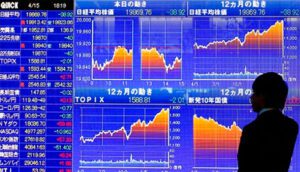
The stock indexes of the largest countries in the Asia-Pacific region (APR) are mainly falling during trading on Wednesday, with the exception of the Japanese indicator.
The Hong Kong Hang Seng index fell 1.5% by 8:23 pm. China’s Shanghai Composite fell 0.8%.
Earlier this week, China’s National Bureau of Statistics (NSO) unexpectedly postponed the release of third-quarter GDP data, scheduled for Tuesday, as reported. This increased uncertainty about the outlook for the Chinese economy, writes Trading Economics.
Shares of biopharmaceutical company Wuxi Biologics (Cayman) Inc. are among the biggest losers in Hong Kong. (-6.3%), developer New World Development Co. Ltd. (-5.6%) and sporting goods manufacturer Li Ning Co. Ltd. (-4.8%).
Shares of online retailer Alibaba (SPB: BABA) shed 2.8%.
The value of the Japanese Nikkei 225 index increased by 0.5%.
Growth leaders among the components of the index are shares of technology SoftBank Group (+3.7%) and electricity producers Tokyo Electric Power Co. Holdings Inc. (+2.9%) and Kansai Electric Power Co. Inc. (+2.5%).
The price of securities of clothing retailer Fast Retailing rose by 1.3%, consumer electronics manufacturer Sony Group – by 0.5%.
South Korean index Kospi fell by 0.1%.
The market value of one of the world’s largest chip manufacturers Samsung Electronics Co. decreased by 1.2%, automaker Hyundai Motor – increased by 0.3%.
The Australian S&P/ASX 200 fell 0.3%.
Shares of the world’s largest mining companies BHP Group and Rio Tinto fell 1% and 0.3%, respectively.
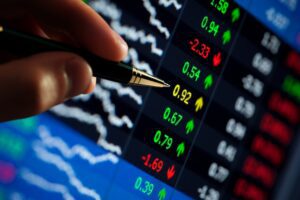
The stock indexes of the largest countries in the Asia-Pacific region (APR) are mainly strengthening at the auction on Thursday, with the exception of the Hong Kong indicator.
Optimistic statistics on the increase in the number of jobs in the United States, published yesterday, dampened hopes that the US Federal Reserve may slow down the pace of tightening interest rates, writes MarketWatch. This put some pressure on stock markets.
The number of jobs in the US private sector in September increased by 208 thousand compared to August, according to the ADP Research Institute. Analysts polled by Dow Jones estimated an increase of 200,000. In August, the number of jobs increased by 185,000, and not by 132,000, as previously reported.
Traders are now waiting for the US Labor Department’s September unemployment report, which will be released on Friday at 3:30 p.m. Experts estimate the unemployment rate in the country last month at 3.7%, the same as in August, and the increase in the number of new jobs in the economy as a whole at 250,000, writes Trading Economics.
Market participants also evaluated the OPEC + decision.
Ministers of the OPEC+ countries at a meeting on Wednesday decided to reduce oil production quotas in November by 2 million bpd.
The value of the Japanese index Nikkei 225 to 8:24 qoq increased by 0.9%.
The growth leaders among the components of the index are the shares of the IT company Rakuten Group Inc. (+4.7%), which issues credit cards Credit Saison Co. Ltd. (+3.9%) and retailer Isetan Mitsukoshi Holdings Ltd. (+3%).
The Hong Kong indicator Hang Seng fell by 0.17% by 8:27 qoq.
The drop leaders in the index are the shares of the pharmaceutical company Hansoh Pharmaceutical Group Co. Ltd. (-7.3%), automaker Geely Automobile Holdings Ltd. (-4.9%) and solar panel manufacturer Xinyi Solar Holdings Ltd. (-3.5%).
Shares of Chinese lithium battery manufacturer CALB Co. depreciated in debut trading in Hong Kong, dropping 1.6% below the placement price of 38 Hong Kong dollars ($4.84) per paper.
Exchanges in mainland China are closed due to the National Day holidays.
The South Korean index Kospi by 8:22 quarter is growing by 1.5%.
The market value of one of the world’s largest chip manufacturers Samsung Electronics Co. increased by 1.8%, automaker Hyundai Motor – by 1.1%.
The Australian S&P/ASX 200 added 0.03%.
Shares of the world’s largest mining companies BHP and Rio Tinto increased by 0.6% and 0.2%, respectively.
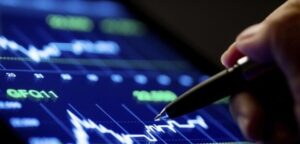
Equity markets in Western Europe fell sharply during trading on Wednesday, following the dynamics of the main stock indexes in the Asia-Pacific region.
The composite index of the largest companies in the Stoxx Europe 600 region fell by 1.69% by 12:30 pm to 381.66 points.
The British stock index FTSE 100 is down 1.57%, the German DAX – 1.6%, the French CAC 40 – 1.24%. Italian FTSE MIB loses 1.56%, Spanish IBEX 35 – 1.78%.
Asian stocks also fell heavily, with Hong Kong’s Hang Seng hitting a 13-year low.
Investors are still worried about forecasts of a global economic recession amid persistently high inflation and aggressive measures by the largest central banks to contain it.
The European Central Bank (ECB) will raise interest rates at the next few meetings, the head of the regulator, Christine Lagarde, said at an event in Frankfurt on Wednesday.
“We will do what we must, which is to keep raising interest rates at the next meetings,” Lagarde said. “Our main goal is price stability, and we must achieve it. If we do not achieve, then the economy will suffer even more.”
In early September, the ECB raised all three key interest rates by 75 basis points (bp) for the second time in a row. The base interest rate on loans was raised to 1.25% per annum, the rate on deposits – up to 0.75%, the rate on margin loans – up to 1.5%. Markets expect the European Central Bank to raise rates by another 75 bp in October.
Meanwhile, the leading indicator of consumer confidence in Germany, calculated by the research company GfK, updated a historical low in October. The value of the indicator fell to minus 42.5 points compared to minus 36.8 points in September. A record low is recorded following the results of the fourth month in a row.
Analysts on average predicted a less significant drop – to minus 39 points, according to Trading Economics.
The consumer confidence index in France in September fell to 79 points compared to 82 points a month earlier, data from the national statistical office Insee showed. As a result, its value coincided with the historical minimum, which was recorded in May 2013 and in July this year.
Experts on average expected a reduction of only 80 points.
German industrial group Thyssenkrupp AG plunged 12.1% to become one of the top three Stoxx 600 stocks. JPMorgan analysts affirmed the company’s underweight rating.
The shares of Norwegian fish companies SalMar ASA (-27.5%) and Mowi ASA (-19.2%) also fell most significantly.
Dutch supermarket operator Royal Ahold Delhaize NV is down 0.6%. The company’s Board of Directors intends to propose to shareholders that they reappoint CEO and Chairman of the Board Frans Müller for another term.
The capitalization of the British fashion house Burberry Group Plc is growing by 3.4%. The company’s chief creative officer, Riccardo Tisci, will retire at the end of September. He will be replaced by Daniel Lee.
Asia-Pacific region, DYNAMICS, European stock markets, Stock indices
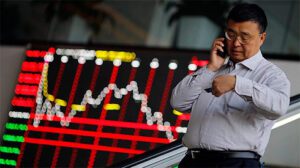
Stock indices of the largest states of the Asia-Pacific region show a significant decline on Wednesday, while the value of the Hong Kong Hang Seng fell to its lowest level in more than 13 years.
Investors fear that aggressive measures by the Federal Reserve System aimed at curbing inflation could push the US economy into recession, according to Trading Economics. The American Standard & Poor’s 500 index dropped to a low of this year a day earlier.
The value of the Japanese index Nikkei 225 to 8:32 quarter decreased by 2%.
Nippon Sheet Glass Co., a glass manufacturer, was the drop leader. (-6.3%), automotive Mitsubishi Motors Corp. (-5.9%), transport Kawasaki Kisen Kaisha Ltd. (-5.4%).
In addition, the price of securities of investment and technology SoftBank Group (-2.8%), console manufacturer Nintendo (-2.3%), retailers J. Front Retailing Co. is declining. (-4.7%) and Fast Retailing Co. (-4.6%).
The leading economic index in Japan in July fell to a 2.5-year low (since January 2021) and amounted to 98.9 points compared to 100.3 points in the previous month.
The Chinese Shanghai Composite index fell by 1.3% by 08:37 Moscow time. The Hong Kong Hang Seng lost 2.7%, while the shares of all companies included in the calculation of the indicator show a decrease in value.
Among the leaders in the reduction of quotations on the Hong Kong Stock Exchange are securities of real estate developers Country Garden Holdings Co. (-11.1%) and Longfor Group Holdings Ltd. (-5.4%), automaker Geely (-6.1%),
solar panel manufacturer Xinyi Solar Holdings Ltd. (-5.7%).
Shares of Internet retailers Alibaba Group fell 2.2% and JD.com – 4.5%, Internet giant Tencent Holdings Ltd. – by 1.2%.
The South Korean index Kospi by 08:33 Moscow time fell by 2.8%.
Quotes of securities of one of the world’s largest manufacturers of chips and consumer electronics Samsung Electronics Co. dropped by 2.4%, automaker Hyundai Motor – by 4.3%.
KR Motors Co., a motorcycle and auto parts maker, was the leader of the increase, with prices soaring 30%.
The Australian S&P/ASX 200 has dropped 0.8% since the market opened.
Shares of the world’s largest mining company BHP traded at the close of the previous session, while the price of securities of another representative of the industry Rio Tinto decreased by 0.6%.
The capitalization of the oil company Santos fell by 1.7%.
Retail sales in Australia in August, according to preliminary data, rose by 0.6% compared to the previous month and reached a record 34.88 billion Australian dollars ($22.3 billion). The increase was noted for the eighth month in a row.
Analysts had expected an average less significant rise of 0.4%.

Stock indices of the largest states of the Asia-Pacific region on Wednesday showed a decrease following the similar dynamics of the US stock market a day earlier.
Traders’ attention is focused on the meetings of the Central Bank of several large countries at once, which will be held this week. The results of the meeting of the leadership of the US Federal Reserve System will be especially important.
Most experts believe that the US Central Bank will raise the base interest rate by 75 basis points (bp) following the meeting, which will end on September 21. However, some analysts consider a 100 bp increase possible at once. In addition, financial market participants will evaluate the forecasts of the Fed regarding the future level of the rate and the economy.
In addition, geopolitical tensions in the world and the expected slowdown in global economic growth have a negative impact on investor sentiment.
The Asian Development Bank (ADB) downgraded its economic growth forecast for emerging Asia for 2022-2023 on Wednesday. amid rising global risks. Now GDP is expected to increase by 4.3% this year compared to 5.2% expected in April, next year – by 4.9% against 5.3% earlier.
“Emerging Asia continues to recover, but the risks are high,” said ADB chief economist Albert Park. to financial instability.
He also noted that the Chinese economy is facing problems due to repeated lockdowns and a weak real estate sector. The estimate of China’s GDP growth for this year was downgraded by ADB analysts to 3.3% from 5% forecast in April.
China’s Shanghai Composite index closed down 0.2%, while Hong Kong’s Hang Seng lost 1.8%. Both indicators are at their four-month lows.
Shares of solar panel maker Xinyi Solar Holdings Ltd were among the top decliners on the Hong Kong Stock Exchange. (-8%), which produces semiconductors Sunny Optical Technology Group Co. (-10.5%), automakers Geely (-4.6%) and BYD (-2.2%), game developer Netease Inc. (SPB: NTES) (-3.6%), online retailers Alibaba (SPB: BABA) (-3.7%) and JD.com (-2.9%).
The value of the Japanese Nikkei 225 index for the day decreased by 1.4%.
Shares of polymer producer Unitika led the fall, losing 7.5%. The price of securities of the investment and technology SoftBank Group (-1.2%), the manufacturer of prefixes Nintendo (-1.2%), automotive Toyota Motor (-2.4%) and Nissan Motor (-3.1%) also decreased.
Shikoku Electric Power’s share price fell 5.2% after the power company announced it would not pay dividends for the first half of the year due to uncertainty about future fuel prices.
South Korea’s Kospi fell 0.9% on Wednesday.
Shares of one of the world’s largest manufacturers of chips and consumer electronics Samsung Electronics Co. fell by 0.9%, automaker Hyundai Motor – by 0.8%.
Auto parts makers Hwacheon Machinery Co. led the pack, up nearly 30% after falling by a similar amount in previous trading.
The Australian S&P/ASX 200 lost 1.6%.
The market value of the world’s largest mining companies BHP and Rio Tinto decreased by 3.1% and 3.7%, respectively. Iron ore prices fell to a nine-month low due to an expected contraction in steel demand.
Oil companies Woodside Energy and Santos lost 1.9% and 1%.
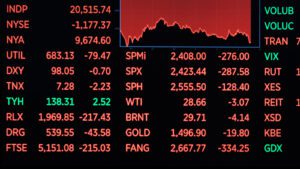
Stock indices of the largest states of the Asia-Pacific region on Thursday change without a single dynamics.
The People’s Bank of China injected 400 billion yuan ($57.9 billion) into the financial system as part of the medium-term lending program (MLF). At the same time, the rate on loans for a period of one year, issued under the MLF, was maintained at the level of 2.75% per annum.
Analysts also did not expect a change in the rate, notes Trading Economics.
China’s Shanghai Composite index fell 1.2% by 8:29 qoq, while Hong Kong’s Hang Seng added 0.4%.
The shares of developers Country Garden Holdings Co. have risen most significantly on the Hong Kong Stock Exchange. (+9.1%), Longfor Group Holdings Ltd. (+6.2%) and China Resources Land Ltd. (+5.9%).
In addition, quotes of insurer Ping An (+1.9%), oil CNOOC (+1.6%), Budweiser Brewing Co. APAC Ltd (+1.4%).
Meanwhile, shares of automakers Geely (-2.8%) and BYD (-1.7%) show a decrease in value.
The value of the Japanese index Nikkei 225 to 8:25 square meters increased by 0.2%.
Growth leaders include cosmetics company Shiseido (+2.1%), railway operator East Japan Railway (+2%), automotive Suzuki Motor (+1.8%) and Nissan Motor (+1.7%), manufacturer of game consoles Nintendo (+1.7%).
At the same time, the prices of papers of metal producers, including Toho Zinc Co., are falling. (-2.8%), Nippon Steel Corp. (-2.2%), Kobe Steel (-1.7%).
Japan increased exports in August by 22.1% compared to the same month last year. The rise was recorded following the results of the eighteenth month in a row.
Imports soared 49.9%, pushing the trade deficit to a record 2.817 trillion yen.
The value of the South Korean index Kospi to 8:25 q decreased by 0.3%.
Shares of one of the world’s largest manufacturers of chips and consumer electronics Samsung Electronics Co. fell 1.1%, while automaker Hyundai Motor added 0.25%.
The Australian S&P/ASX 200 rose 0.3% since the market open.
The market value of the world’s largest mining companies BHP and Rio Tinto increased by 0.5% and 0.2%, respectively. Oil companies Woodside Energy and Santos rose 4.4% and 3.5%.
Unemployment in Australia rose unexpectedly to 3.5% in August. A month earlier, it was at a record low of 3.4%, and analysts did not predict changes.
The increase in unemployment occurred for the first time in the last ten months.